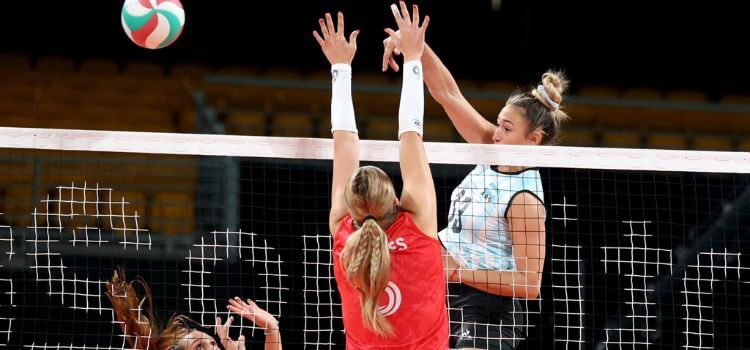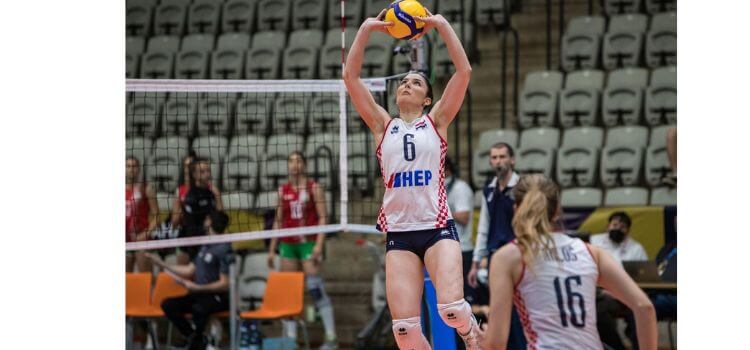As an Amazon Associate, I earn from qualifying purchases
Volleyball is a sport that involves two teams of six players each, who try to score points by hitting a ball over a net and making it land on the opponent’s court. Volleyball is a sport that requires skill, agility, coordination, and teamwork.
But volleyball is not only a physical activity, it is also a mental activity. Volleyball can have positive effects on one’s mental health and well-being, such as reducing stress, improving mood, enhancing cognitive function, and regulating emotions.
This essay will explore how volleyball helps you mentally, and what are the benefits and mechanisms of playing this sport for your mental health.
Physical Activity and Mental Well-being
The Impact of Exercise on How does volleyball help you mentally?
Exercise is widely recognized as a beneficial factor for physical health, but it is also a crucial factor for mental health. Exercise can help prevent and treat various mental disorders, such as depression, anxiety, and schizophrenia.
Exercise can also improve the quality of life and well-being of people with mental health problems, as well as the general population.
Exercise can have positive effects on mental health through several mechanisms, such as physiological, psychological, and social.
volleyball help you mentally as a Form of Exercise
Volleyball is a form of exercise that can provide many of the benefits of physical activity for mental health. Volleyball is a moderate to vigorous intensity exercise, depending on the level and duration of play.
Volleyball can improve one’s cardiovascular fitness, muscular strength, endurance, and flexibility. Volleyball can also burn calories, regulate weight, and prevent obesity.
Volleyball can also enhance one’s immune system, reduce inflammation, and lower the risk of chronic diseases, such as diabetes, heart disease, and cancer.
All of these physical benefits can have positive impacts on one’s mental health, as they can improve one’s self-image, self-esteem, and confidence, as well as reduce the symptoms and complications of mental disorders.
Endorphins and Stress Reduction
One of the physiological mechanisms by which volleyball can help you mentally is by releasing endorphins. Endorphins are natural chemicals that are produced by the brain and the nervous system, and act as painkillers and mood boosters.
Endorphins are released during and after exercise, especially when the exercise is intense, challenging, and enjoyable. Endorphins can reduce the perception of pain, increase the tolerance of discomfort, and induce a state of euphoria, happiness, and relaxation.
Endorphins can also lower the levels of cortisol, the stress hormone, and increase the levels of serotonin, the happiness hormone. By releasing endorphins, volleyball can help you cope with stress, improve your mood, and enhance your well-being.
Social Benefits of Volleyball
Building Connections and Social Support
One of the psychological and social mechanisms by which volleyball can help you mentally is by building connections and social support.
Volleyball is a team sport that requires communication, cooperation, and coordination among the players. Volleyball can help you develop and maintain social relationships, such as friendships, partnerships, and memberships.
Volleyball can also help you expand your social network, as you can meet and interact with new people who share your interest and passion for the sport. Volleyball can also provide you with social support, which is the emotional, informational, and practical assistance that you receive from others.
Social support can help you cope with stress, adversity, and challenges, as well as enhance your self-esteem, confidence, and satisfaction.
By building connections and social support, volleyball can help you feel less lonely, isolated, and alienated, and more connected, accepted, and valued.
Teamwork and Cooperation
Another psychological and social mechanism by which volleyball can help you mentally is by fostering teamwork and cooperation.
Volleyball is a sport that requires the players to work together as a unit, and to coordinate their actions and strategies. Volleyball can help you develop and improve your teamwork and cooperation skills, such as communication, leadership, decision making, problem solving, and conflict resolution.
Volleyball can also help you learn and practice the values and principles of teamwork and cooperation, such as trust, respect, responsibility, and accountability.
Volleyball can also help you experience the benefits and rewards of teamwork and cooperation, such as achieving a common goal, sharing a collective effort, and celebrating a joint success. By fostering teamwork and cooperation, volleyball can help you become a better team player, a better leader, and a better person.
Boosting Confidence and Self-esteem
Another psychological and social mechanism by which volleyball can help you mentally is by boosting your confidence and self-esteem.
Confidence is the belief in your own abilities and potential, and self-esteem is the evaluation of your own worth and value. Volleyball can help you boost your confidence and self-esteem by providing you with opportunities and challenges to test and improve your skills and performance.
Volleyball can also help you boost your confidence and self-esteem by providing you with feedback and recognition from yourself, your teammates, your coach, and your opponents.
Volleyball can also help you boost your confidence and self-esteem by providing you with a sense of achievement and accomplishment, as well as a sense of pride and identity. By boosting your confidence and self-esteem, volleyball can help you become more confident, assertive, and positive.
Stress Relief and Relaxation
Distraction from Daily Stressors
One of the psychological mechanisms by which volleyball can help you mentally is by providing you with a distraction from daily stressors.
Stressors are the events, situations, and demands that cause you to feel stressed, anxious, or overwhelmed. Stressors can be external, such as work, school, family, or finances, or internal, such as thoughts, feelings, or expectations.
Volleyball can help you distract yourself from stressors by engaging you in a physical, mental, and emotional activity that requires your attention, concentration, and involvement. Volleyball can help you forget about your worries, problems, and concerns, and focus on the present moment, the game, and the fun.
Volleyball can help you escape from reality, and enter a state of flow, which is a state of optimal experience, where you are fully immersed, absorbed, and satisfied with the activity.
By providing you with a distraction from stressors, volleyball can help you reduce your stress, anxiety, and negative emotions, and increase your happiness, enjoyment, and positive emotions.
Mindfulness and Focus
Another psychological mechanism by which volleyball can help you mentally is by enhancing your mindfulness and focus.
Mindfulness is the awareness and acceptance of your present experience, without judgment or reaction. Focus is the ability to concentrate and direct your attention on a specific task or goal.
Volleyball can help you enhance your mindfulness and focus by requiring you to pay attention to your body, your breath, your movements, and your sensations.
Volleyball can also help you enhance your mindfulness and focus by requiring you to pay attention to your surroundings, your teammates, your opponents, and the ball.
Volleyball can also help you enhance your mindfulness and focus by requiring you to pay attention to your strategy, your tactics, and your decisions.
By enhancing your mindfulness and focus, volleyball can help you become more aware, attentive, and present, as well as more calm, clear, and composed.
Improving Cognitive Function
Enhancing Brain Health
One of the physiological mechanisms by which volleyball can help you mentally is by enhancing your brain health. Volleyball can improve your brain health by increasing the blood flow, oxygen, and nutrients to your brain, which can stimulate the growth and development of new brain cells, connections, and regions.
Volleyball can also improve your brain health by reducing the inflammation, oxidative stress, and toxins in your brain, which can prevent and delay the degeneration and deterioration of your brain cells, connections, and regions.
Volleyball can also improve your brain health by enhancing the production and release of various neurotransmitters, hormones, and growth factors, which can modulate and regulate the function and activity of your brain cells, connections, and regions.
By improving your brain health, volleyball can help you prevent and treat various cognitive disorders, such as dementia, Alzheimer’s, and Parkinson’s, as well as improve your memory, learning, and intelligence.
Strategic Thinking and Problem Solving
Another physiological mechanism by which volleyball can help you mentally is by stimulating your strategic thinking and problem solving.
Strategic thinking is the ability to plan, analyze, and evaluate your actions and outcomes, and to adapt and adjust your actions and outcomes according to the changing circumstances and conditions. Problem solving is the ability to identify, define, and resolve the problems and challenges that you face.
Volleyball can stimulate your strategic thinking and problem solving by requiring you to devise and execute your game plan, and to anticipate and react to your opponent’s game plan.
Volleyball can also stimulate your strategic thinking and problem solving by requiring you to deal with various uncertainties, complexities, and difficulties that arise during the game, such as errors, mistakes, injuries, and penalties.
Volleyball can also stimulate your strategic thinking and problem solving by requiring you to learn from your experience, feedback, and results, and to improve your skills, performance, and outcomes.
By stimulating your strategic thinking and problem solving, volleyball can help you become more strategic, analytical, and evaluative, as well as more adaptable, flexible, and creative.
Coordination and Motor Skills Development
Another physiological mechanism by which volleyball can help you mentally is by enhancing your coordination and motor skills development.
Coordination is the ability to synchronize and harmonize your movements and actions, and to control and manipulate your body and objects. Motor skills are the abilities to perform various movements and actions, such as running, jumping, throwing, catching, and hitting.
Volleyball can enhance your coordination and motor skills development by requiring you to perform various complex and precise movements and actions, such as serving, passing, setting, spiking, blocking, and digging.
Volleyball can also enhance your coordination and motor skills development by requiring you to coordinate and synchronize your movements and actions with your teammates, and to adjust and adapt your movements and actions to the ball, the net, and the court.
Volleyball can also enhance your coordination and motor skills development by requiring you to practice and master your movements and actions, and to improve your speed, accuracy, and power.
By enhancing your coordination and motor skills development, volleyball can help you become more coordinated, skillful, and efficient.
Managing Emotions Through Sport
One of the psychological mechanisms by which volleyball can help you mentally is by helping you manage your emotions.
Emotions are the feelings and reactions that you experience in response to various events, situations, and stimuli. Emotions can be positive, such as happiness, joy, and excitement, or negative, such as sadness, anger, and fear.
Volleyball can help you manage your emotions by providing you with an outlet and a channel to express and release your emotions. Volleyball can also help you manage your emotions by providing you with a balance and a contrast to your emotions.
Volleyball can also help you manage your emotions by providing you with a feedback and a reinforcement to your emotions.
By helping you manage your emotions, volleyball can help you become more emotionally stable, healthy, and mature.
Channeling Energy Productively
Another psychological mechanism by which volleyball can help you mentally is by channeling your energy productively.
Energy is the capacity and potential to perform work and action. Energy can be positive, such as motivation, enthusiasm, and passion, or negative, such as frustration, anger, and aggression.
Volleyball can help you channel your energy productively by providing you with a constructive and beneficial activity to use and direct your energy. Volleyball can also help you channel your energy productively by providing you with a satisfying and rewarding outcome to achieve and attain your energy.
Volleyball can also help you channel your energy productively by providing you with a positive and healthy way to vent and release your energy. By channeling your energy productively, volleyball can help you become more productive, effective, and successful.
Coping Mechanisms and Resilience
Another psychological mechanism by which volleyball can help you mentally is by developing your coping mechanisms and resilience.
Coping mechanisms are the strategies and techniques that you use to deal with and overcome stress, adversity, and challenges. Resilience is the ability and quality to bounce back and recover from stress, adversity, and challenges.
Volleyball can help you develop your coping mechanisms and resilience by exposing you to various sources and levels of stress, adversity, and challenges, such as physical, mental, emotional, and social.
Volleyball can also help you develop your coping mechanisms and resilience by teaching you and enabling you to use various coping mechanisms, such as problem-focused, emotion-focused, and appraisal-focused.
Volleyball can also help you develop your coping mechanisms and resilience by strengthening and enhancing your resilience factors, such as self-efficacy, optimism, and hardiness. By developing your coping mechanisms and resilience, volleyball can help you become more resilient, adaptable, and resourceful.
Volleyball as Therapy that How does volleyball help you mentally?
Therapeutic Benefits of Physical Activity

Volleyball can also help you mentally by serving as a form of therapy. Therapy is the process and practice of treating and healing various physical, mental, emotional, and social problems and disorders.
Therapy can be delivered by various professionals and methods, such as psychologists, counselors, and psychotherapists, and cognitive, behavioral, and humanistic therapies.
Volleyball can serve as a form of therapy by providing many of the therapeutic benefits of physical activity, such as improving mood, reducing stress, enhancing self-esteem, and increasing well-being.
Volleyball can also serve as a form of therapy by providing some of the therapeutic benefits of specific therapies, such as cognitive therapy, which aims to change and improve one’s thoughts and beliefs, behavioral therapy, which aims to change and improve one’s actions and habits, and humanistic therapy, which aims to change and improve one’s self and identity.
Incorporating Volleyball into Mental Health Treatment
Volleyball can also help you mentally by being incorporated into your mental health treatment. Mental health treatment is the plan and program of interventions and services that are designed and delivered to help and support you with your mental health problems and disorders.
Mental health treatment can include various components and elements, such as medication, psychotherapy, counseling, and support groups.
Volleyball can be incorporated into your mental health treatment by being prescribed and recommended by your mental health provider, such as your doctor, therapist, or counselor, as a complementary and alternative therapy.
Volleyball can also be incorporated into your mental health treatment by being integrated and combined with other therapies, such as cognitive-behavioral therapy, which can use volleyball as a tool and technique to modify and improve your thoughts and behaviors, or group therapy, which can use volleyball as a medium and platform to facilitate and enhance your social interaction and support.
Case Studies and Success Stories
Volleyball can also help you mentally by inspiring you with case studies and success stories. Case studies are the detailed and in-depth descriptions and analyses of specific individuals, groups, or situations that illustrate and exemplify a phenomenon, problem, or solution.
Success stories are the narratives and accounts of individuals, groups, or situations that demonstrate and celebrate a positive and desirable outcome, result, or achievement.
Volleyball can inspire you with case studies and success stories by showing you how volleyball has helped and improved the mental health and well-being of various people and populations, such as athletes, veterans, refugees, and prisoners.
Volleyball can also inspire you with case studies and success stories by showing you how volleyball has enabled and empowered various people and populations to overcome and transcend their mental health problems and disorders, such as depression, anxiety, trauma, and addiction.
Conclusion
Volleyball is a sport that can help you mentally in many ways. Volleyball can help you mentally by providing you with physical activity and mental well-being, by releasing endorphins and reducing stress,
by building connections and social support, by fostering teamwork and cooperation, by boosting confidence and self-esteem, by providing you with a distraction from daily stressors, by enhancing your
mindfulness and focus, by improving your brain health and cognitive function, by channeling your energy productively, by developing your coping mechanisms and resilience, by serving as a form of therapy, and by inspiring you with case studies and success stories.
Volleyball is a sport that can improve your mood, reduce your anxiety, enhance your self-image, increase your happiness, sharpen your mind, and strengthen your spirit. Volleyball is a sport that can help you mentally.
Frequently Asked Questions about How Volleyball Helps You Mentally:
Q: How does playing volleyball contribute to mental well-being?
A: Volleyball promotes mental well-being through various means such as stress relief, improved focus, enhanced self-confidence, and better mood regulation.
Q: Can volleyball help in reducing stress?
A: Yes, engaging in volleyball can serve as a form of stress relief by allowing players to release pent-up tension and focus their energy on the game, thus promoting relaxation.
Q: How does volleyball improve focus and concentration?
A: Volleyball requires constant attention to the game, opponents, teammates, and the ball’s trajectory. This focus helps sharpen concentration skills, which can translate to better concentration in other aspects of life.
Q: Does playing volleyball enhance self-confidence?
A: Absolutely, participating in volleyball can boost self-confidence as players develop skills, improve teamwork, and experience personal growth through overcoming challenges and achieving success on the court.
Q: Can volleyball help in managing emotions and mood regulation?
A: Yes, volleyball provides an outlet for emotions and can help regulate mood by promoting positive feelings through physical activity, teamwork, and the sense of accomplishment that comes with playing well.
Q: How does volleyball foster teamwork and social connections?
A: Volleyball is inherently a team sport, requiring collaboration, communication, and trust among players. By working together towards a common goal, players develop stronger bonds and forge meaningful social connections.
Q: Can playing volleyball help in developing resilience?
A: Indeed, volleyball teaches resilience by exposing players to setbacks, failures, and challenges. Overcoming these obstacles fosters resilience, determination, and the ability to bounce back stronger.
Q: Is volleyball suitable for individuals of all ages and skill levels?
A: Yes, volleyball can be enjoyed by people of all ages and skill levels. There are various formats and levels of play, including recreational leagues, club teams, and professional competitions, catering to a wide range of players.
Q: How often should one play volleyball to experience mental benefits?
A: The frequency of play depends on individual preferences and schedules. However, regular participation, whether it’s weekly games or practices, is recommended to fully experience the mental benefits of volleyball.











